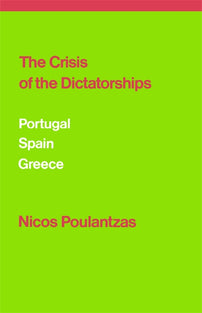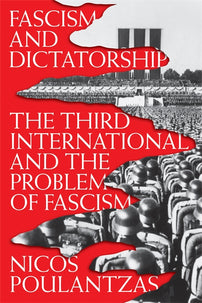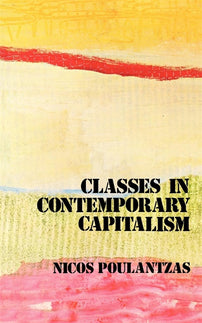A Revolutionary from the OECD - the Castoriadis/Poulantzas debate
In 1977, an intense debate raged in the Greek press between Nicos Poulantzas and Cornelius Castoriadis, sparked by remarks made by Poulantzas in an article that questioned Castoriadis political commitment to ending the dictatorship in Greece, and his position as a high-level economist for the OECD. Here, published in English for the first time, is the record of the debate – published with an introduction by Dimitris Psarras and Dimitris Karidas.

The 12th July this year marked 45 years since the fall of the dictatorship in Greece. October 3rd marked another important anniversary: 40 years since the passing of Nicos Poulantzas.
The period of regime change saw a rebirth in the battle of ideas, a phenomenon that had initially begun in the era of resistance to the dictatorship. Here we unearth a brief episode from the ideological confrontations of the period, one that is characteristic of the intensity and passion of the clashes. The protagonists of this debate were the political philosopher Nicos Poulantzas and Cornelius Castoriadis. While the latter did not personally respond until quite a few years later, his immediate defence was swiftly undertaken through open letters written by two of his closest supporters.
The incident began with a blunt, scornful reference to Castoriadis made by Poulantzas in an article published on New Year’s Day in 1977. Two letters followed, prompting a response to one of them by Poulantzas and, finally, Castoriadis’ rebuttal almost two years later – all of which are translated below.
Politically speaking, the question at the heart of the debate was the regime change, since Poulantzas criticizes Castoriadis' book The Revolutionary Problem Today, which had just been translated in to Greek, particularly his positions on the fall of dictatorship, the Left, and the progressive movements. There, Castoriadis’ condescending treatment of the anti-dictatorial movement was squarely at odds with Poulantzas’ analysis in The Crisis of Dictatorships. However, Poulantzas' two articles provoked reactions largely because they raised two "delicate" matters: the fact that Castoriadis was a high-level OECD official, and his flagrant refusal to support the anti-dictatorial movement, even with his signature.
The emphasis on these negative elements of Castoriadis' trajectory were considered unfair or even spiteful by his supporters, to the point that it was still sparking reactions from them twenty years after Poulantzas's death.
[book-strip index="1" style="buy"]The biographer confirms
The truth is that both of Poulantzas’ harsh remarks are confirmed in François Dosse’s essential biography of Castoriadis. Dosse refers to the Poulantzas-Castoriadis incident, unequivocally siding with the latter, as he wants to believe, without further explanation, that the former Marxists did not forgive him for being “right so early on"
However, in the same paragraph, the biographer notes that various nationalists in Greece "attempted to appropriate [Castoriadis] by distorting his views". And a little further on: "In a period of the far-right's resurgence in Greece, [Castoriadis’] idea that modern Greeks are direct descendants of the Greeks of antiquity can be very dangerous, leading to views of a 'chosen race'”.
As for the fact that Castoriadis was a senior OECD official, his biographer admits that "this situation amounts to a sort of split in his personality". Dosse cites the opinion of Castoriadis's companion of four decades, Claude Lefort: "I find his claim to embody the spirit of the revolution intolerable while reproducing in an inverted way the totalitarian myth (this, for me, is the main reason for which I do not want us under any circumstance to be identified, or regarded a pair). [...] The way in which he benefits from this society, in which he brazenly declares that he feels alien and is therefore allowed to earn from it his ... crust, is very irritating for me ".
As for Castoriadis' attitude during the dictatorship, beyond the actions of a few in Paris seemingly inspired by him, the reader will search the 620-page biography in vain for a single word on the matter. Obviously, he was absorbed by what he eventually admitted to during the Hellenic Broadcasting Corporation’s anniversary broadcast on the participation of Greeks in the May '68 uprising, namely that he had refrained from active involvement for fear of deportation.
This inaction in fear of deportation was also recorded by his biographer. It is as if everyone has forgotten that what had escalated the Parisian May had been precisely the expulsion of a "German Jew" Daniel Cohn Bendit. Moreover, the - albeit theoretical - risk of deportation ceased in 1970, when Castoriadis assumes French citizenship. In the same year, he departed from the OECD to pursue a career in psychoanalysis. The junta however, lasts until July 1974.
Castoriadis’ response
Castoriadis himself would later confine himself to an ironic sneer at Althusser, OPLA [Organization for the Protection of the People's Struggle, a 1940s Communist urban guerrilla group in Greece], and Poulantzas, avoiding any of the issues raised by the latter. He referred to the incident belatedly, amidst a general polemic directed at Althusser, published in the journal "Libre" in 1978.
Since Castoriadis considered Althusser’s reference to revolutionaries and movements persecuted by regimes which claimed to be guided by Marxist principles as mere “cunning”, he wrote: “As for me, I did not disappear, despite the efforts of some Greeks, friends of Althusser, throughout the duration of the occupation (and to move onwards from something which was not at all humorous towards something which certainly is, despite the attempts of some other buddy of Althusser’s, someone named Poulantzas, who wrote in the Eurocommunist -yes- Greek newspaper Avgi in January of 1977…that the discussion of my ideas is worthless because I am employed in the service of American imperialism) and I feel less “forgotten” than ever.”
In any case, Castoriadis’ stance was obsessively contemptuous in relation to any and all political activity in Greece. When asked in 1989 to sign a letter condemning the Turkish junta and expressing support for four Greek antifascists detained there after a solidarity event at a military court, a letter signed by several other French intellectuals, he refused exclaiming: “I do not understand the Greek sensitivity for four Greeks, while all these years Turkey has lived under a junta”.
And yet throughout this period many individuals, as well as a great many organizations of the Left and the Far Left, had organized a considerable amount of practical solidarity for persecuted Turkish antifascists.
Castoriadis could easily have learnt this from the press, and he obviously no longer needed to fear deportation.
[book-strip index="2" style="buy"]1. Poulantzas on Castoriadis (“H Avgi”, 1/1/1977, excerpt from an article titled “The year 1976 in the field of science and intellectual thinking”)
Some of the most interesting original books this year were the ones pertaining to history. The groundbreaking scientific renewal in Greece under the influence and hegemony of Marxism is translated for the first time into a plethora of important works analyzing Greek reality, mainly by scientists who have studied or worked in Paris (Svornos, Tsoukalas, Elefantis, Moskov, Emmanouil, Veltsos, Iliou, Vergopoulos, Dimitrakos, Patrikiou and others, if we only mention those that have already published books in Greek). This expresses a turn towards the study of the shaping of the Greek social formation: that is, toward a search for the roots (with the synchronous meaning of origins and foundations) of the originality and particularity of the Greek setting. […]
As a necessary counterbalance to all this we observe the beginning of the “anti-Marxist” counteroffensive. This counteroffensive one would expect, but it is one that does not come forth from the thought of the traditional Right. Instead, it takes particular forms and appears, amongst others, under a “hyper revolutionary” pretext–that “we must, if we are to be truly revolutionaries, abandon Marxism”. In the European sphere, this tendency has at times appeared with publicly proclaimed works (such as those of Foucault and Deleuze), but, here in our country, it appears in the guise of an eclectic jumble of words and as a popularized by-product of European irrationalism, particularly in the writings of our compatriot Cornelius Castoriadis about which there has recently been much discussion and which so greatly seem to inspire the neo-Christian Orthodox philosopher Christos Giannaras.
Of course, a work must to an extent be distinguished from the author's person and character. But aside from the poor quality of this work, I will take upon myself the unpleasant responsibility of noting that it is certainly not an accident that the writings of the "hyper revolutionary" Castoriadis emanate from a man who has for a number of years, and until very recently, served as one of the leading executives of the OECD–one of the central bodies, along with the World Bank, of American imperialism in Europe, and who was very nearly the only Greek intellectual residing abroad to systematically and explicitly refuse the slightest even symbolic participation (such as a signature of protest in 1967 or following the events of the Polytechnic University) in the opposition to the dictatorship.
I refer to this example in a completely incidental manner in order to arrive at an additional characteristic of this last year’s intellectual production: the absence of Marxist thinking from the ideological front of opposition to the various neo-idealist ideologies. One could say that it would be enough for these to be presented with progressive and democratic authors, so that in the name of some sort of historic compromise in the ideological-theoretical field (something altogether absurd) critique would be paralyzed and cease. An absence that, and let's not fool ourselves, will be paid dearly and that today already leaves the door open to arguments such as those aforementioned.
Nicos Poulantzas
[book-strip index="3" style="buy"]2. Regarding an article of Nicos Poulantzas (“Avgi”, 12/1/1977)
To disagree with a literary work, whatever the work may be, is the inalienable right of anyone of us. When you, however, reject the work of Cornelius Castoriadis in the columns of the press you are obliged (foremost to oneself) to put forward arguments that attest to such a judgement. Under no circumstances, if you want to pass for a scholar, can you simply brush aside works such as those by Castoriadis, on which most serious newspapers in the world have expended reams, as an "eclectic jumble of words" and a "popularized by-product of European irrationalism".
Additionally, Mr. Nicos Poulantzas, in his article in Avgi of January 1st, notes that "it is certainly not an accident that the writings of the 'hyper revolutionary' Castoriadis emanate from a man who has for a number of years and until very recently served as one of the leading executives of the OECD, one of the central bodies... of American imperialism in Europe"
Why is Mr. Poulantzas leading with this? Does he believe that Cornelius Castoriadis is an agent of American imperialism? If he does in fact believe it, he should have the courage to tell us in a forthright manner. If not, he should have taken a better care of his wording. It is just as naive to characterize someone with regard to their employer as it is to characterize them with regard to their familial relations.
Erifili Kartali, Athens
3. Cornelius Castoriadis and his work (Excerpt from a letter to “Eleftherotypia”, 25.1.1977)
1. Poulantzas is knowingly lying through his teeth when claiming that Castoriadis "systematically denied, even symbolic participation (a signature of protest in 1967 or following the events of the Polytechnic) in opposition to the dictatorship."
Firstly, Castoriadis did not "systematically and explicitly refuse" anything for the plain reason that he was never asked to "sign protests". Second and most importantly, Castoriadis' political praxis is not constituted by "signing protests", a method employed by various intellectuals by which they wage feuds amongst themselves and compensate for their lack of political activity. What Castoriadis did and did not do throughout the duration of the dictatorship is known to his political comrades in both Paris and Greece, with whom he remained in close contact throughout the period of illegality. As for this latest attempt of exploiting the Polytechnic, with which Poulantzas attempts to take advantage of the youths sensitivity, let us note that the Greek group with which Castoriadis collaborated in Paris published and disseminated immediately after the events among the Greeks of Paris, the first and, to this day, more or less most exhuastive analysis of the events of the Polytechnic University and their significance.
2. Poulantzas is also lying when asserting that Castoriadis had "until very recently served as one of the leading executives of the OECD, one of the central bodies, along with the World Bank, of American imperialism in Europe". Castoriadis worked at the OECD International Secretariat as a technical officer (an economist) and not as a political officer, or a "leading" executive.
The job he did at the OECD was no different from what he would have done if he had worked at a "national" ministry of finance or at a central bank or even a university. Are Poulantzas’ various salaries paid for through the spontaneous contributions of the international proletariat? Or does the University have no "social function"? Castoriadis remained at the OECD for as long as was necessary for him to have a residence permit in France. As soon as he was naturalized (October 1970) he immediately resigned from the OECD.
3. This phrase of Poulantzas is a treasure of malice, lies and amalgams: "In the European sphere, this tendency has at times appeared with publicly proclaimed works (such as those of Foucault and Deleuze), but here in our country it appears in the guise of an eclectic jumble of words and as a popularized by-product of European irrationalism, particularly in the writings of our compatriot Cornelius Castoriadis over which there has recently been much discussion". First things first, Castoriadis does not appear anywhere "in our country" where, except for a small book released in late November of 1976, his writings are yet to be published.
Castoriadis had since 1949 appeared in the western- European sphere with the group and journal “Socialism or Barbarism”, where he wrote and acted under a pseudonym, and in 1973 began to eponymously publish his books. He undertook the critique of Marxism from 1955 until 1964, in other words years before Foucault and Deleuze made their appearance as authors of an extra- academic and extra- philosophical stature. Poulantzas feeds false information to the Greek public, which he obviously disdains, implying that Marxism is being criticized by Foucault and Deleuze. So far as we are aware, these authors have attempted no such critique of Marxism. As for the character of Castoriadis's work being "an eclectic jumble of words and popularized by- product", let just this be said: This work began in 1945-1946 and was published in 1949 in "Socialism or Barbarism", a journal of limited circulation, but however, as was proved by May 1968 in France, of great influence.
Its publication today allows the reader to discern two things. First, that with the passage of time following the first publication of his essays, Castoriadis' analyses have been increasingly confirmed (the character of Russian, Chinese, etc. bureaucracy as an exploitative class, a new analysis of the crisis of capitalism, self-management as the real content of socialism and so on). Second, that this work has been the subject of constant theft on the part of various "Marxists" and other "theorists" who have benefited from the journal’s limited circulation and the essays being undersigned with a pseudonym, appropriating various ideas, in order to distort and vulgarize them, presenting them as their own.
Example: Poulantzas himself. All this "Marxist" professor, as well as various other "theorists" of Eurocommunism mouth in a journalistic manner regarding the phenomena of the Soviet regime are but a vulgarized by-product of the analysis of the nature of Soviet society carried out by Castoriadis immediately after the war and are contained in his essay on the "The Relations of Production in Russia" (1949). In this essay, among other things, is a ruthless criticism of the then advocate of the Russian bureaucracy (and afterwards an advocate of the Chinese bureaucracy) Charles Bettelheim.
Twenty years later, Bettelheim "forgot" all that he wrote in 1946-1948, and plagiarized Castoriadis' fundamental ideas without of course making reference of it. Another example: Poulantzas' fellow Althusserian, Maurice Godelier, who began to criticize Marxism in 1973-1974 by reproducing (without reference) and hollowing out what Castoriadis had written in 1964 in his essay "Marxism and Revolutionary Theory".
One can have as many objections as one wants to Castoriadis' ideas, just as one may on the views of every great thinker. There is one thing one cannot do: to deny the high quality of the work, the depth of his thinking. This work covers fields such as philosophy, epistemology, the economy, linguistics, and psychoanalysis. […]
The last point is the most crucial due to the fact that it by far exceeds persons, and is of political importance. For what reason, whilst next to nothing of Castoriadis' work has been published in Greek, does Avgi at this time release such an article? There can only be one answer: This endeavor tends, through slander, to completely exclude the substantive conversation that is to be had upon the ideas that are of significance to them. And why such an article? The "Eurocommunists" through "self-criticisms" and criticisms, are crying their hearts out and beating their chests about the crimes of Stalinism (in which they were complicit and in relation to which they ideologically blindfolded). They try to convince the public that they have really changed. Yes. They have simply turned their clothes inside out. The neo-Stalinists of 1977 are, in essence, no different from the Stalinists of 1947 or 1937. And they do what they do, being out of power. Anyone can easily surmise what they would do if they were in power.
Chr. D. Loukopoulos
Paris, January 1977
[book-strip index="4" style="buy"]4. Poulantzas’s response
In a short article published by Avgi in its New Year’s paper, attempting a review of the movement of ideas in 1976 in the field of science and culture, I made reference to C. Castoriadis in a somewhat blunt way. I regret that, with this article, I provoked a flurry of reactions, some directed towards Avgi, as characteristically expressed in a letter by Mrs E. Kartali (12.1.1977).
I will try to reply–relatively briefly–to this letter and provide clarifications on the main elements of my article, in particular on a few points that explain its violent tone towards C. Castoriadis. I must say however, in advance, that I find the letter of E. Kartali and the relevant reactions very positive and promising. This shows a healthy and legitimate suspicion and sensitivity to any form of dogmatism or neo-Stalinism. But let's look at things more soberly: Is this really the case?
1. I begin with a question posed in my article in Avgi: Is it possible for a political thinking, and I specify not any thinking whatsoever (on art, for example), but a thinking that is openly and explicitly, given its structure and reason, as political and even more so a political thinking described as revolutionary, like that of C. Castoriadis, to be considered completely separate and detached from the specific political practice of its actor? I answer without hesitation: NO. This view, I think, justified my underlining in the Avgi article the paradox that a political thought that refers to the developments after the end of the dictatorship and that criticizes all others, that its Greek author remained categorically and completely unaccounted for in the struggle against the dictatorship and the struggle at the Polytechnic University. Is this a sign of Stalinism on my part? I think Jean-Paul Sartre has long posed these problems better than anyone to the point of them being entirely self-explanatory, without any person, I believe, considering him a Stalinist!
2. I linked this general theme to something very specific: C. Castoriadis has recently published a book (truly lively in the first part) with the modest title The Revolutionary Question Today in which he shares his views on Greek reality. And I was referring to this book when referring to C. Castoriadis in my Avgi article.
In this book C. Castoriadis responds to an observation of a "Third Person" that the people did not desire a "Karamanlis solution", [consitutional solution, via the existing opposition parties] however it was enacted.
Furthermore, he writes that: "I think that in this manipulation there was general complicity. All organized political forces maintain a similar stance: vigilance against breaks and deviations. There was a silent complicity amongst what you may call the 'progressive forces'". And he goes on to say: "Most of all we need to understand that we have nothing to expect from them or any other leaders. As long as we debate on this basis we remain within the framework of the regime and bound to its forms. We must understand that the sole purpose of 'progressive leadership' is the maintenance of the status quo".
This book was published with a preface by C. Castoriadis himself in November 1976. And we have–if i have properly understood it, because we must someday finally learn how to read–at a time when the Democratic Alliance in the opposition, under conditions of extraordinary hardship, is on the advance, an intellectual of a pompous political thought responsibly and without exception denouncing Mavro, Papandreou, Drakopoulos, Floraki, Iliou, Tsatsos, Magkakis, the Socialist March, etc. as agents of the establishment and the status quo, and of being complicit in the current situation. I note in fact that C. Castoriadis is not simply opposed to a strategy or tactic (the Democratic Alliance for example) but denounces the entirety of the progressive forces claiming that their sole purpose, by their very nature, is merely the maintenance of a regime that could not to be preserved without them. That is to say that they constitute, not to be naive, the principal enemies of any genuine revolutionary. Supported by the above, I considered it correct not to contradict this "view" per se, but to emphasize the political position and stance from which he who denounces the progressive forces of our country in such a way speaks, where he was and what he did when they, the conservative forces and agents according to their castigator, were struggling, in peril, tortured, imprisoned. Greece must finally cease to be regarded as a place where anyone can say anything in expectation of a profit, and where an elementary political morality must be established. Because every Reason stands somewhere and comes from somewhere, unless we still believe in the freischwebende Intelligenz [the free-floating intellect, a concept introduced by Karl Mannheim].
Was I wrong to ask: WHO and WHENCE he speaks and note the utter absence of the revolutionary C. Castoriadis from the struggles he refers to in order to rain down on everyone? I do not think so. And if there's a scandal in the matter, it won't be in what I said, but in that no one thought it necessary to come out with it earlier.
As for C. Castoriadis' professional occupation, I simply made mention of it, first to note that some professional occupations may even formally prevent their holder from taking a political position and then they must decide, and secondly to say that when one condemns all progressive leadership, as agents of the establishment, should perhaps consider their own accession into the establishment.
Finally, I insist that I am not here referring to the various insults Mr. Castoriadis has hurled at the Resistance and December events. Let others deal with those. I am solely interested in what I have personally experienced.
3. Let us now see to what extent my Marxist dogmatism manifested itself in my Avgi article. In his book, C. Castoriadis, writes the following regarding contemporary thought in general and not only Marxism (its anti-Marxism is perhaps the least to note): "That which exists today in the world, which is industrially produced in mass, are plastic ‘spiritual’ products, nylon ‘thinking’ and synthetic ‘art’. Thus, for example, structuralism, various pseudo-psychoanalytic currents, Althusser, semiotics, etc. In this industry of plastic thought the French have in fact made a name for themselves, and now export, mainly to the Anglo-Saxons, these kinds of fashions, genuine Articles de Paris - as used to be fragrances, women's dresses, etc. "
So, depending on whether I have properly understood, Mr. C. Castoriadis is attempting, in an extraordinarily 'erudite' fashion, to erase in a single stroke the entirety of contemporary science and thought, serious psychoanalysis (anti-psychiatry), linguistics, ethnology (structuralism), Marxism–whilst, of course, proposing the only singular thought to be his own!
In this regard, I should recall that in my lecture delivered at Panteion university last year, published in Avgi in March of '76, I underscored the enormous value of sciences such as psychoanalysis, linguistics, etc., and welcomed the importance of their introduction to Greece. So, at a time when after so many struggles a serious engagement with these sciences has finally begun in our country, C. Castoriadis, with irresponsible sloganeering, and aided by the relative ideological-theoretical confusion still prevalent in Greece, attempts to move us backwards. I did not consider it necessary to seriously refute all that C. Castoriadis unacceptably upholds. In Avgi I plainly expressed my wholly personal view of their scientific quality and his more general oeuvre, which I still consider to be a popularized by-product of modern European irrationalism. That which I could have included is that many of the older and younger proponents of conservative ideology have every reason to capitalize on what C. Castoriadis advocates–indeed with a "leftist" patent in their war against the "barbarians", in other words against Marxism, psychoanalysis (not conservative, but contemporary anti-psychiatry), linguistics, ethnology, etc.
Was there a matter of confusion in essence and in depth with that which C. Castoriadis upholds? Undoubtedly, what really did exist is the problem of profoundly refuting the generalized contemporary irrationalist and neo-idealist current–of which C. Castoriadis, in my view, is but an altogether secondary element–in its most significant and substantial forms. Of course, I could not accomplish this in my brief informative article in Avgi.
I will conclude by stating that I hope my article in Avgi will give occasion, even in the form of a provocation, to disturb the relative stagnation of ideological-theoretical life in our country, in order to reveal the real fissures, ruptures and ideological fronts that are today deeply concealed under a semblance of angelicness, and are compelled to someday be driven towards a substantive confrontation. Until then, I will not return to this issue.
Nicos Poulantzas
Translation by Alexis Ioannides
[book-strip index="5" style="display"]





